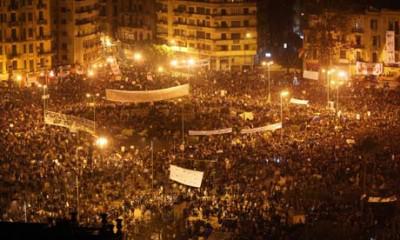
Tahrir Square in January (Photo: Peter Macdiarmid/Getty Images)
Who actually participates in a democratic revolution? I studied this question at school and read all sorts of learned essays on the topic, but I’ve never actually lived through a revolution. So when thousands of Egyptians poured into Tahrir Square last January to demand Mubarak’s departure, I was intellectually excited if personally a little annoyed that they hadn’t done this ten years earlier when I lived a block and a half from Tahrir.
During the seven years I spent in Egypt, friends and I often played “What if?” We speculated about any number of scenarios for the end of the Mubarak regime, but somehow a popular revolution always seemed the least plausible option. Who would stand up against that formidable state security apparatus?
I finally got a chance to ask some of these questions when I returned in July for the first time in about five years. As I met with old friends and colleagues and even cabbies and shopkeepers, my first question was, “What happened?? Egypt was always the land where nothing changes!”
I think the most astute analysis came from an old work colleague of mine, an investment banker who has spent his 30-year career promoting Egyptian business. “Both sides misjudged the other,” he said. Many of the protestors who went out the first day, his daughter included, were students from the American University in Cairo, and he thinks the government took them for spoiled kids who would shout and wave their signs for a while, then get tired and go home to play on their X-Boxes. The protestors, on the other hand, expected the security forces to intervene much more aggressively. He thinks the speed and energy with which the movement expanded surprised everyone.
“So where were you during all of this?” I asked.
“Down on Tahrir as of the third day,” he said with a shy smile that betrayed both pride and a little embarrassment.
“Get out of here!” I’m thinking to myself. This guy is one of the most conservative people I know. I’ve never seen him out of a suit and tie.
“Irhal! Ya3ni imshi! Yimkin ma tafhamshi!” he quietly chanted in the tony dining room at the Four Seasons. “Leave (Mubarak)! That means go away! Maybe you don’t understand!”
I asked him why he participated, and he didn’t answer directly, but he told me about his two kids. He asked his daughter why she was down there, and she responded, “So the Egyptian people can have a better future.” He asked his son, a political science major, why he wasn’t down there, and he said, “I live in a villa. I have a car. I have an X-Box. Why would I want a revolution?”
So while he didn’t admit it directly, I think my old investment banker friend finally sided with his daughter, hoping for a better future for all Egyptians.
All of this said, things are far from rosy in Egypt these days. The economy has taken a severe hit. Tourism is dormant. Foreign direct investment has collapsed. These are hard times, and people are very frustrated with the interim government for not delivering more and faster. My friend worries about how that frustration will play out politically.
He doesn’t buy the comparisons to democratic transitions in Eastern Europe. “They have discipline there,” he says. “Egyptians are the most disorderly people in the world.” He complains that the revolutionary movement has fragmented into a kaleidoscopic array of groups with their own parochial demands.
“Welcome to democracy,” I told him. “Sounds like you’re on the right path.”
David Shelby is the director of the Near East Office at the State Department’s Bureau of International Information Programs. Previously, he spent seven years in Egypt studying Arabic and working for local businesses.

